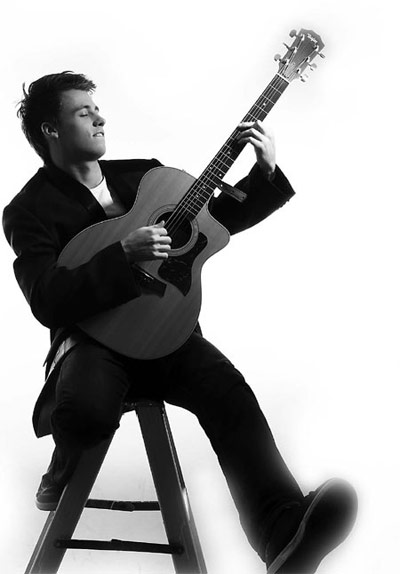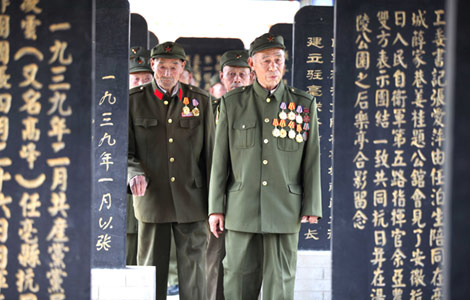Red singer rising
Updated: 2012-09-24 14:22
By Chen Yingqun (China Daily)
|
||||||||
 |
|
Martin Cityzen sings Chinese "red songs" as a way to bridge cultural differences. Provided to China Daily |
US performer strikes a chord while exploring the appeal of patriotism without borders. Chen Yingqun listens as a laowai finds fame with a song praising the courage of the Red Army.
Mention "red songs" in China and images of massed choirs belting out patriotic, revolutionary scores spring to mind.
Many older folk who still remember the struggles on the road to New China fear that the songs, heavy with tradition, are losing their appeal with younger audiences who are more interested in pop music.
Enter Martin Cityzen, a 25-year-old Colorado native who is fast building a reputation as a hip-hop singer of Chinese folk music. During the Spring Festival this year, Cityzen was invited to perform at galas for Chinese TV stations.
Cityzen, whose real name is Martin Papp, first shot to fame in July 2011, after his online video rendition of Yingshanhong, a famous song praising the courage of the Red Army, received about 1.5 million hits in less than three weeks.
The US performer added hip-hop and reggae elements, rewrote some of the lyrics and recreated some parts of the song to give it a "modern twist".
"I like his takes, which refresh the old songs and give them a new vitality," says Zheng Yang, a fan of Cityzen's red renditions as well as folk songs. "He also has a beautiful voice and impressive performance skills."
Cityzen's passion for music started when he was a child. He put together a band during high school before heading to St. Lawrence University in New York, studying political science and economics. He arrived in Shanghai in 2006 as an exchange student.
After performing in gigs in Shanghai, he discovered his music struck a chord with Chinese audiences - prompting him to consider seeking his musical fortune in the country.
"In China," he says, "I can travel, experience a different culture, learn a new language and be part of a fast growing market, which are all great benefits I wouldn't have in America."
So he returned to China in 2009 after graduating and got a job teaching English in a college in Nanchang, Jiangxi province. But three times a week, he would play the guitar and sing in a bar for about one hour, earning about 100 yuan ($16).
His singing career took off with an appearance in the 2010 Happy Boys, a Chinese talent show similar to American Idol.
"I would never do this in America as my mentality growing up was always more alternative," he says. "But in China, if you want to become a famous singer but don't have a large social network and connections, TV competitions are helpful."
Cityzen recalls how he had to write new songs very quickly after passing the show's various rounds, getting his friends to translate the lyrics into Chinese.
"An important lesson I've learned is that even if you are not fully prepared, you should still go for it; do not let the fear of not being perfect stop you," he says.
By playing his own music, he finally made it to the top 30 among more than 200,000 participants. He quit his teaching job and focused on music.
Cityzen found himself drawn to the unique aspects of Chinese folk music, many of them red songs. "I like red songs like Yingshanhong, which have very beautiful melodies. It's beautiful no matter what you sing about."
But Cityzen is also trying to come up with his own original music.
"I want the Chinese audience to see me as an artist, just like other singers that write original music. And listen to the music because they like the song, not just because they like a white guy singing in Chinese. It is a challenge that I look forward to."
He enjoys the fact that the singing culture is very popular in China - though the idea of singing at the dinner table took some getting used to.
"Music is very lyrically driven. So songs that people can remember and can sing at karaoke sessions are very important," says Cityzen, who has been speeding up his Chinese language lessons so that he can write better lyrics.
In 2010, Cityzen started a band in Beijing called Martin's Crosswalk after meeting some people who shared his musical dreams of making it in the country. Besides writing and playing music with his band mates, he has also written, acted in and directed two 20-minute movies, telling stories about their musical aspirations.
"Martin is humorous and optimistic," says Fan Runyu, the band's drummer. "But when it comes to work, he is a perfectionist. He takes every rehearsal as a real performance and won't stand any slight errors."
He is now working on a first album that includes all his original songs. But he also wants to perform in bigger shows and be able to hold concerts.
"That should happen when I have enough fans to fill a big stadium," he says.
Contact the writer at chenyingqun@chinadaily.com.cn.











